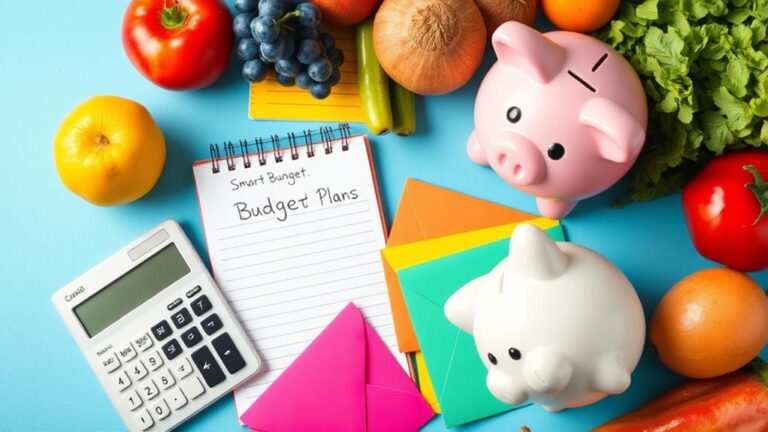7 Essential Tips for Grocery Saving to Slash Your Bill
To slash your grocery bill, start by utilizing coupons and tracking store sales, which can save you a significant amount each year. Conduct price research to compare costs and focus on unit prices for better deals. Analyze bulk purchases carefully, ensuring they're worth the investment. Substitute expensive ingredients with more affordable options. Prioritize seasonal and versatile produce to maximize nutrition and savings. Implement meal planning for efficient use of your grocery list and reduce food waste by using leftovers creatively. Each strategy plays a key role in minimizing expenses, and there's much more to explore that can enhance your savings strategy.
Key Takeaways
- Utilize digital coupons and store loyalty programs to maximize discounts and save significantly on purchases.
- Conduct price research to compare costs and ensure you are getting the best deals available.
- Plan meals around weekly sales, using versatile ingredients to create balanced meals while minimizing costs.
- Reduce food waste by understanding expiration dates and creatively using leftovers in new recipes.
- Stick to a grocery budget and make a detailed shopping list to avoid impulse buys and unnecessary expenses.
Utilize Coupons and Sales

Utilizing coupons and sales is one of the most effective ways to cut down your grocery expenses. By leveraging digital coupons from apps like Ibotta and Checkout 51, you can save an average of $316 annually when you combine these with store sales. Start by downloading the Flipp app to access local sale flyers and compare prices across multiple grocery stores, making sure you find the best deals available in your area.
Researching grocery store sale days and tracking local promotions can greatly maximize your savings. Shopping during these targeted times can reduce your grocery bill by up to 50%. Don't overlook store loyalty programs; they often provide exclusive discounts and rewards, leading to savings of 5% to 20% on your overall purchases.
Meal planning around weekly sales flyers guarantees you're purchasing ingredients at the lowest prices. This strategic approach not only helps you stick to your budget but also simplifies your shopping experience. By taking the time to incorporate these tactics into your grocery shopping routine, you'll enjoy greater financial freedom and reduce your overall spending.
Conduct Price Research

Conducting thorough price research can transform your grocery shopping experience. By leveraging grocery store websites, you can compare prices from the comfort of your home, identifying the best deals before you even step into a store. This proactive approach not only helps you avoid impulse buys but also guarantees you're well-informed about prices and promotions.
When you conduct price research, utilize unit prices for a more accurate assessment of cost-effectiveness across different brands and packaging sizes. This knowledge empowers you to make smarter purchasing decisions that align with your budget. Additionally, researching local grocery store sale days can help you time your shopping trips perfectly, allowing you to take advantage of weekly discounts and promotions.
Don't overlook the power of online tools and apps, which can facilitate easy price comparisons across multiple stores. By doing this, you can pinpoint where to shop for the best overall value, maximizing your grocery savings. With these strategies in place, you'll feel more in control of your budget and enjoy the freedom that comes with smarter shopping choices. So, immerse yourself in your price research and watch your grocery bill shrink!
Analyze Bulk Purchases
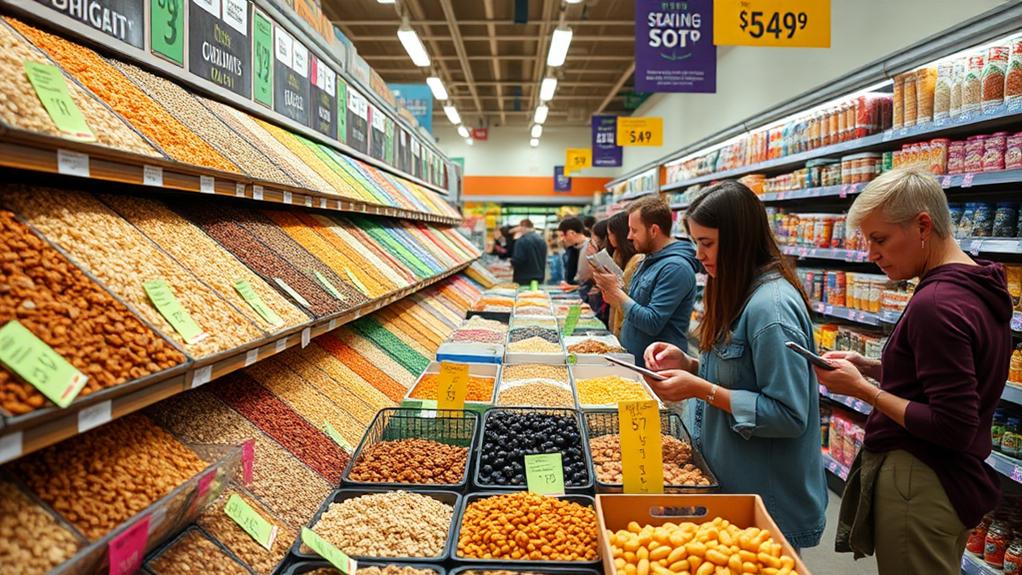
After you've researched prices, the next step is to analyze bulk purchases. While buying in bulk can seem like a money-saver, it's essential to evaluate the details before committing.
- Check the unit price (price per ounce or item) to guarantee you're getting a better deal.
- Focus on non-perishable items like rice and canned goods, which often yield greater savings over time.
- Avoid buying perishables in bulk, as they can spoil and lead to waste and overspending.
- Compare prices between bulk bins and pre-packaged items to find the best value.
Remember that bulk purchases can be cost-effective, but they also require careful consideration. Assess whether you have enough storage space and a suitable consumption rate to justify the bulk buy. If not, you could end up wasting money and space. By analyzing bulk purchases, you can better manage your grocery budget and make informed decisions that align with your financial freedom goals.
Substitute Ingredients Wisely
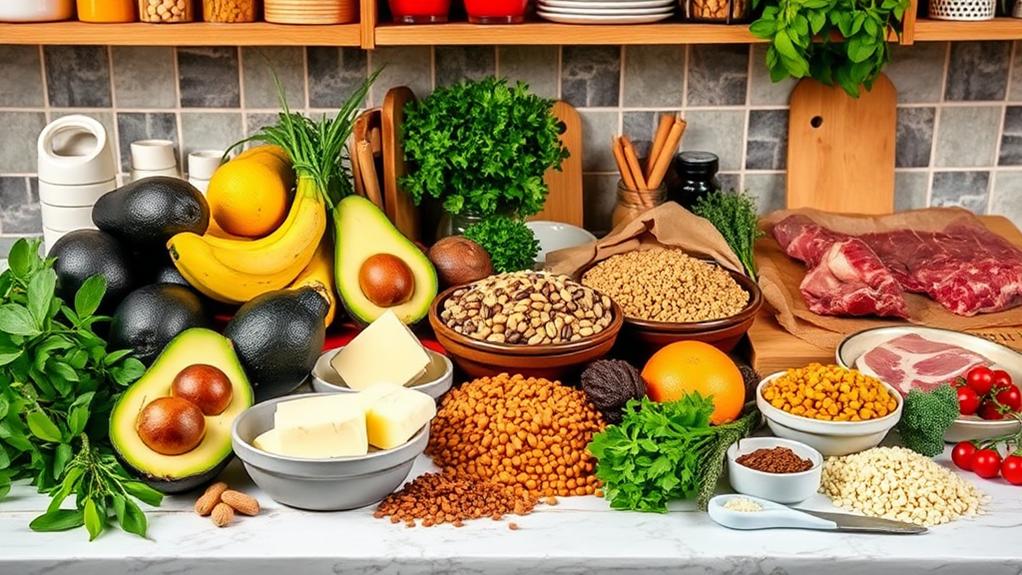
When you're looking to save money on groceries, substituting ingredients wisely can make a significant difference in your overall budget. Start by considering cheaper alternatives to expensive meats. Beans and lentils, for instance, provide essential protein while drastically reducing meal costs. You can also replace costly cheeses with lower-priced options or use smaller amounts combined with herbs to maintain flavor without overspending.
Utilizing grains like rice, quinoa, or barley not only enhances meal bulk but also allows you to cut back on pricier ingredients, ultimately reducing expenses. Seasonal vegetables are another great option; swapping kale for cabbage can save you money while keeping nutrition intact.
Additionally, experimenting with homemade sauces using pantry staples like vinegar and oil is a smart move. This not only curbs spending on store-bought versions, which often have additives, but also empowers you to control flavors in your dishes. By making these thoughtful substitutions, you'll maximize your food budget and enjoy delicious meals without the hefty price tag. Embrace these strategies, and watch how quickly you can save money on groceries!
Focus on Affordable Produce
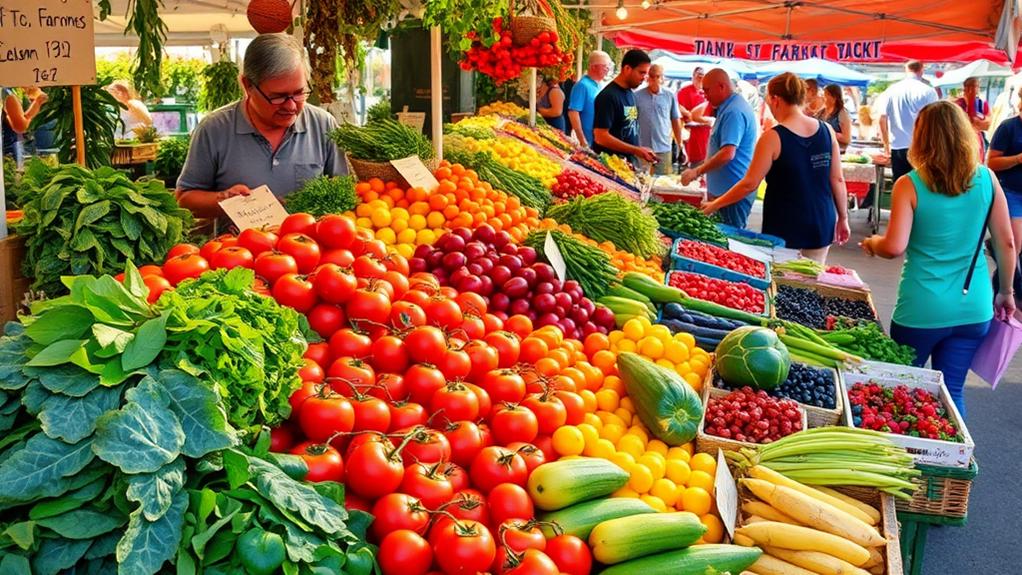
Focusing on affordable produce can greatly impact your grocery budget, especially if you incorporate a variety of inexpensive vegetables into your meals. By choosing seasonal produce, you not only save money on food but also support local farmers while enjoying fresher, tastier options. Here are some practical tips to enhance your grocery savings:
- Buy versatile vegetables like potatoes, carrots, and cabbage that can bulk up meals without increasing costs considerably.
- Look for bulk deals at farmers' markets or discount stores, where prices can be 25% to 50% lower than typical grocery prices.
- Plan your meals around current sales on affordable produce, which encourages creativity in your cooking while maximizing savings.
- Utilize leftover ingredients to reduce waste and create new dishes, promoting healthier eating habits.
Incorporating these strategies into your shopping routine allows you to reduce waste and enjoy a variety of nutritious meals, all while sticking to your budget. By being mindful of your produce choices, you empower yourself to make cost-effective decisions that align with your desire for financial freedom.
Implement Meal Planning

Implementing meal planning can transform your grocery shopping experience and greatly cut down your expenses. By dedicating just 1-2 hours each week to create a structured meal plan, you can reduce grocery costs by as much as 50% compared to dining out. Start by focusing on versatile ingredients that work in multiple recipes, allowing you to maintain a balanced diet without overspending.
Plan your meals around grocery store sales to take advantage of discounts and stock up on non-perishables. This strategy not only slashes your grocery spending but also helps you avoid impulse buys that often lead to food waste. Don't forget to incorporate leftovers into your planning; creatively using them can extend the value of your groceries and minimize frequent shopping trips.
For added efficiency, consider using a budgeting app to track your grocery costs and stay within your budget. With thoughtful meal planning, you'll not only enjoy the freedom of choice in your meals but also greatly cut down on unnecessary expenses, making your grocery shopping a smarter, more enjoyable task.
Reduce Food Waste
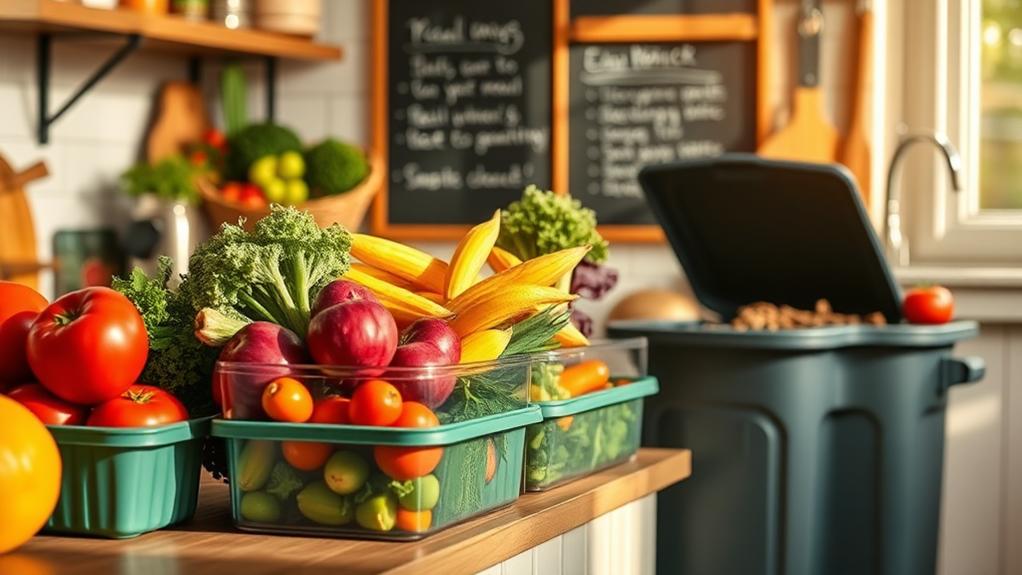
Reducing food waste is an essential step in maximizing your grocery budget and promoting sustainability. By understanding expiration dates and sell-by dates, you can effectively use food before it spoils, potentially reducing waste by up to 20% of your grocery purchases.
Here are some practical tips to help you minimize food waste:
- Plan meals around what you already have to reduce unnecessary purchases.
- Get creative with leftovers; think of turning roast chicken into soup or stir-fry.
- Freeze excess food, like fruits and vegetables nearing their sell-by date, to extend their shelf life.
- Compost food scraps and peels to create nutrient-rich soil, enhancing your garden while cutting landfill waste.
Implementing these strategies not only saves you money but also fosters a more sustainable lifestyle. By planning meals effectively and creatively using leftovers, you can tackle the average household food waste of 30-40%. Embrace the freedom that comes with being resourceful in your grocery purchases, and watch your savings grow while making a positive impact on the environment.




